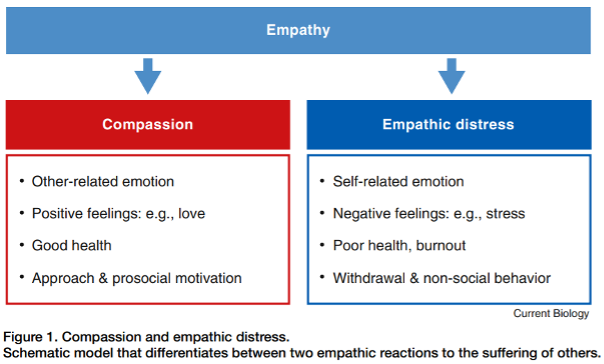
De wetenschap er achter
Ontwikkeld in Stanford
CCT™ is ontstaan aan het Center for Compassion and Altruism Research and Education (CCARE) van de Universiteit van Stanford. Daardoor is wetenschappelijk onderzoek van het hoogste kaliber ingebakken in het DNA van Compassion Cultivation Training.

Empathie en compassie zijn twee verschillende manieren van reageren op ongemak en pijn van een ander of van onszelf. Empathie is gerelateerd aan het pijn-circuit in ons brein. Compassie is gerelateerd aan het beloningssysteem. Dat verklaart waarom empathie alleen niet voldoende is en kan leiden tot burn-out. Compassietraining maakt ons weerbaar en vergroot het plezier in het werk.
Gepubliceerde ‘peer-reviewed’ onderzoeken specifiek naar de werking en effectiviteit van onze CCT methode:
- Effect of a Compassion Cultivation Training Program for Caregivers of People With Mental Illness in Denmark
A Randomized Clinical Trial - Compassion meditation increases optimism towards a transgressor
- Implicit or Explicit Compassion? Effects of Compassion Cultivation Training and Comparison with Mindfulness-based Stress Reduction
- Investigating Moderators of Compassion Meditation Training in a Community Sample
- Altering the Trajectory of Affect and Affect Regulation: the Impact of Compassion Training
- The effects of Compassion Cultivation Training (CCT) on health-care workers
- A wandering mind is a less caring mind: Daily experience sampling during compassion meditation training
- Pilot study of a compassion meditation intervention in chronic pain
- Compassion meditation training for people living with chronic pain and their significant others: a pilot study and mixed-methods analysis
- A randomized controlled trial of compassion cultivation training: Effects on mindfulness, affect, and emotion regulation
- Enhancing Compassion: A Randomized Controlled Trial of a Compassion Cultivation Training Program
- Compassion cultivation training promotes medical student wellness and enhanced clinical care
- A compassion-based program to reduce psychological distress in medical students: A pilot randomized clinical trial